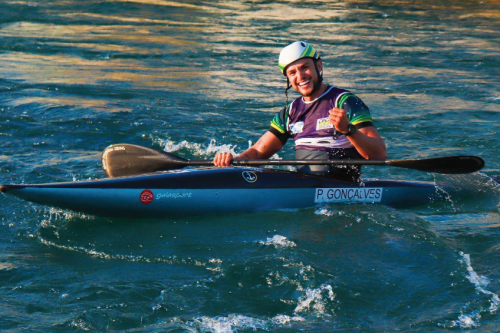
How do I start a competition? Routines, Rituals and Top Tips

Cristiano Ronaldo always puts his right foot on the pitch first. Before each jump, Markus Eisenbichler (World Champion ski jumper) pats his chest three times with his left hand. And I always get into my boat from the left. I think every one of us has or had at least one similar pattern of behaviour as an athlete when training or a competition started.
But why am I doing this at all and what is the point?
A competition means an enormous pressure situation. Athletes are observed by judges, helpers, coaches and the public. In addition, there are the demands we place on ourselves and the expectation of showing our best performance. We want to switch off our nervousness, stress and pressure as best we can. We want to achieve inner serenity, structure our thoughts and thereby gain stability in order to be able to concentrate on one task. Because, it’s all about the mind, it decides the result of the competition, so we want to increase our mental strength as much as possible.

Rituals and routines can help us achieve our ideal performance level. Appropriately for our sport, this is also called the flow state. It describes a state of optimal conditions in which we find ourselves in a balance between challenge and ability. If all parameters are perfect for me, so I don't feel underwhelmed or overwhelmed, my actions merge with the feeling of control and I experience the flow state.
And how do I get into the flow? For me, the competition always starts the day before the actual race. I always skip the last whitewater training session. That way I can never leave the water with a bad feeling and be annoyed that I didn't do something. Instead, I only do 6 sprints of 10 seconds each in flat water. I only look at the competition course in detail on the actual day of the competition, so I can sleep more relaxed because I'm not yet thinking about the individual sections. And when you think about training, with full run training you don't know the course the day before either, you get to know it an hour before your training, so why should I do it any differently in a competition?
About 1.5 hours before my race I walk the route and discuss it with my trainer. 1 hour before my race I get in the boat and warm up for exactly 30 minutes. I've been paddling the competition route twice in my mind. The first time I don't move at all, I sit in the boat, close my eyes and just imagine it. The second time I sprint and imagine myself paddling the competition course. Then I walk along the competition course again and 10 minutes before my start I get back in my boat.

And what do I think of when I‘m paddling into the start-box? I've tried many things and I don't think there is one "right" approach. Everyone has to find it for themselves. At the moment, in the last 10 minutes before a start, I'm trying to think about how I trained and if I can't blame myself, but can say I wasn't lazy, I always made an effort and did everything to prepare myself optimally, then I'm a whole lot closer to my "flow state". Incidentally, for me that doesn't mean that I've trained as much as possible, but that I've completed every training session consciously and with a specific goal in mind, and not because it was on the training plan, but because I wanted to.
This is easy to write now, but the fun should never be neglected. In the qualifying races for the Olympic Games in Tokyo against Sideris, I didn't have that much fun anymore. I was way too focused on beating him and doing the maximum in every practice session and taking everything seriously that I barely had any fun in my practice or in the competitions. I didn't allow myself to make mistakes anymore and that attitude is quite depressing. That's why it didn't work. In the second half of the 2021 season I had this fun again, I was able to train well with my training colleagues, it was a relaxed atmosphere, there was delicious cheese and wine at the training camp and we did a lot together and that ultimately gave me the strength to be back on the podium at the Worlds in Bratislava. And I want to feel this fun at every competition when I’m paddling into the start-box, so I think of this nice time.

And my third ingredient for a successful competition is a little hubris. Sometimes you just have to say to yourself "I'll do it now and the others can kiss my ass". But really only sometimes that shouldn't happen too often…
One last ritual of mine: 10 seconds before my start I always take a small sip of water. No matter where I am.
Do I mix these three ingredients: "I'm satisfied with my training", "enjoying the sport" and this "I'll do it now" attitude. Then I am sure that the competition will be quite good.
Looking forward to season 2022!
Bye, Franz
I've also written down a few simple tools that both athletes and coaches can use.
● Eating the same meals at each race, no experiments
● Always go the same way to the competition site
● Music playlist
● Draw the competition course
● Write down the movements of your run
● Play a card game or something similar during breaks in competition
● Exercises (yoga, pilates, meditation etc.)
● Start the day offline, no cell phone, no PC, etc...
● Learning something new (language, Rubicks Cube, homework, crossword puzzles, Sudoku, juggling)
● Define the exact goal, the athletes should choose the task themselves. It should be a goal, you they can achieve by their own. Clean run, specific time…
● Distractions before the competition - going to the cinema, going to a restaurant, eating ice cream together, something unforeseen like pottery or painting
● Always have something “tasty” for the athlete to eat/drink
● Special handshake/greeting
● As little information as possible and as much information as necessary on walking the course or other topics related to race day
● A positive attitude
● Evaluate successes and failures equally
● Trust in the athlete's opinion. If you have a different opinion, carefully question the decision.
● Radiate calm even when it's hectic or something doesn't meet the expectations, keep the stress away from the athletes. Never under time pressure.
● Always be informed, know the start times, know the program, thorough/thought-out planning
● Unconditional parental consent (especially for younger athletes)
● Communal cleaning up and tidying up strengthens the team spirit and underlines that both coaches and athletes are on the same level










